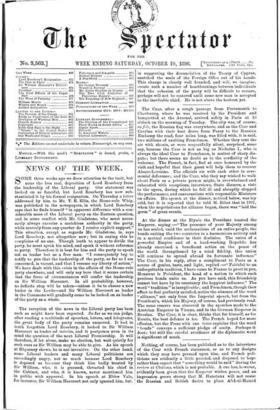At the dinner at the Elysee the President toasted the
Emperor, saying The presence of your Majesty among us has sealed, amid the acclamations of an entire people, the bonds uniting the two countries in a harmonious activity and in a mutual confidence in their destinies. The union of a powerful Empire and of a hard-working Republic has already exercised a beneficent action on the peace of the world. Strengthened by a tried fidelity, this union will continue to spread abroad its fortunate influence." The Czar, in his reply, after a compliment to Paris as a source of genius, taste, and light, replied :—" Faithful to an unforgettable tradition, I have come to France to greet in you, Monsieur le President, the head of a nation to which such precious bonds unite us. As you have said, this friendship cannot but have by its constancy the happiest influence." The word " tradition " is inexplicable ; and Frenchmen, though they affect to feel perfectly satisfied, notice the absence of the word "alliance," not only from the Imperial speech, but from the President's, which his Majesty, of course, had previously read. The same reserve was observed in the speeches made to the Austrian Emperor in Vienna, and to the German Emperor in Breslau. The Czar, it is clear, thinks that for himself, as for Russia, the best defence is ice. The French hoped for more effusion, but the Press with one voice explains that the word "bonds" conveys a sufficient pledge of amity. Perhaps it does; but still the careful avoidance of the diplomatic word is significant of much.


















































 Previous page
Previous page